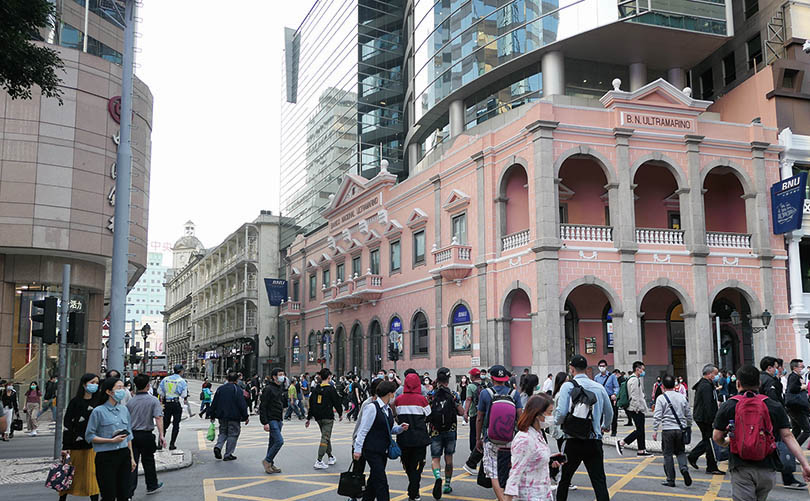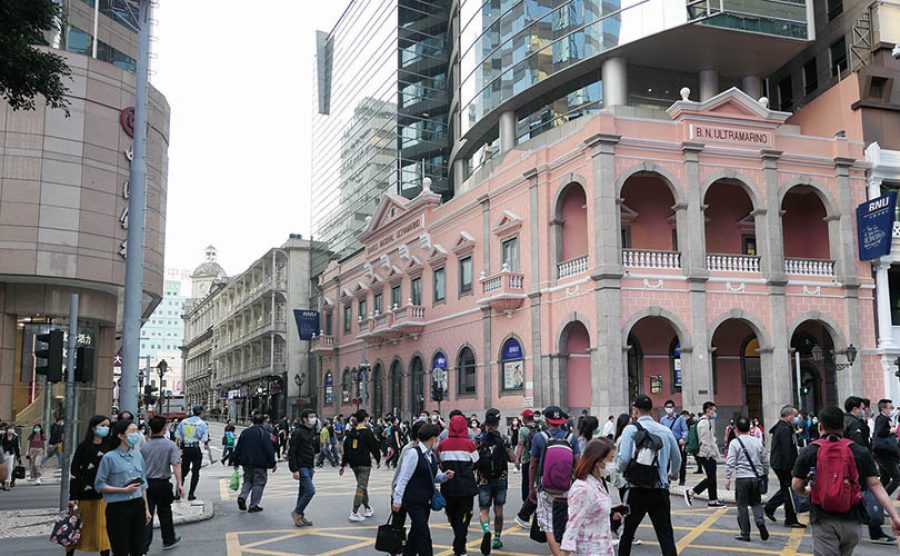By Matthew Keegan, USNews
Macau sees more than 100,000 Chinese visitors from the mainland per day. However, despite high urban density that would make it a perfect COVID-19 breeding ground, deaths have been avoided and cases remain below 40.
Considered the most densely populated region on earth with a population of about 679,600 – 21,340 people per square kilometre – Macau has only recorded 31 confirmed cases of the novel coronavirus, with 10 recovered and discharged from Conde S. Januário Hospital Centre.
No new infections were reported in the city for 39 days. Only in the last two weeks has the city seen an increase in imported cases as Macau residents – many of them students – from overseas returned.
On March 15, the first new COVID-19 case imported from Portugal was announced. The remaining 20 cases since then have all been imported. But as of Thursday, with 31 cases total, Macau is still managing better than many others in the region. Singapore and Taiwan, two places lauded for their responses, have since seen cases climb into the hundreds.
One aspect of Macau’s response to the virus, which has so far claimed the lives of more than 21,000, that distinguishes it has been its willingness to act quickly.
The first COVID-19 case was confirmed January 22 and immediately, Chief Executive Ho Iat Seng implemented measures that cut back public services and require all passengers aboard public transportation to wear facemasks. Schools, both non-tertiary and tertiary, soon closed and still remain so.
By January 27, authorities barred visitors from Hubei province unless they could produce a medical certificate showing they were free of COVID-19.
“Macau followed the first confirmed cases and reacted really fast,” says Glenn McCartney, assistant professor of hospitality and gaming management at the University of Macau. “Initially, we had a few non-resident workers coming into Macau with coronavirus. There was potential for this to flare up and so the government immediately put a ban on people coming and going.”
The 10th case was confirmed on February 4. That same day, authorities announced all 41 casinos would close for 15 days, seen as a bold move as 80 per cent of government revenue comes from gaming taxes. Other entertainment venues also closed, such as theatres, gyms, cinemas and night clubs.
“Macau was the first city outside China – albeit an SAR of China – that was the first to go on lockdown,” says McCartney. “The measures were tough, especially for someone like me who likes to go to the gym every day. We were suddenly told no gyms, no bars, no restaurants, public parks – everything closed.”
With renewed imported cases in recent days, again, the government responded quickly. On Tuesday, and in effect as of Wednesday, the Chief Executive announced plans to ban visitors from mainland China, neighbouring Hong Kong and Taiwan who have travelled overseas in the previous 14 days. Foreign nationals are completely prohibited from entering Macau.
There’s been a sense of acceptance in Macau society that these tough measures were necessary to curb this growing pandemic in such a densely packed city. And the course of action Ho’s administration took against the virus has been viewed positively by most of the general public.
“Macau residents, in general, are satisfied with the government responsiveness on the coronavirus as the related bureaus hold daily press conferences to update the newest information on government policies,” says Ieong Meng U, a professor of political science at the University of Macau. “Also, the Macau government guaranteed that every resident can buy 10 face masks every 10 days.” He adds that “policies give local residents confidence that the government is doing its job and is moving in the right direction.”
As the situation in China slowly returns to normal, recovery is soon on the horizon for this tourism-reliant city, with 70 per cent of its visitors coming from the Chinese mainland. With a decade of growth in its gaming sector, Macau’s reserves are capable of boosting its own economy. As Secretary for Economy and Finance Lei Wai Nong shared February 13, Macau has MOP 560 billion (US$70.8 billion) in financial reserves. In 2018 alone, Macau made MOP 302.8 billion (US$37.6.5 billion) in gambling revenue.
The government expects to spend MOP 20 billion (US$2.5 billion) on measures to support the economy which include loans, tax breaks and direct payments. In addition, MOP 2.19 billion (US$276.8 million) in e-vouchers will be issued to the general public to encourage spending.
“Our tourism industry is hurting because we’re a tourism city and so the virus outbreak has been a financial blow,” says McCartney. “Although a lot of the bigger companies will have reserves, even with the government loans that are being given out, small businesses will still have a debt to pay over the coming years.”
A ghost town a month ago, people are slowly returning to their daily routine of visiting restaurants, parks and even museums. Most of the casinos have also reopened.
“While it is true that people’s daily lives are still significantly influenced by the coronavirus – schools are closed and the business of the casinos are seriously undermined – as far as I have seen, there is no panic in the Macau society,” says Meng U. “Local residents are generally feeling safe to go on the street, but are still wearing face masks.”
McCartney believes Macau will likely see a ramping up toward recovery this spring.
“We rely on the China market and will be looking towards China for the recovery,” he says. “Most of China has reopened – the roads have reopened and transportation as well as factories; there’s a sense that things are slowly getting back to normal. We expect that the next phase will be the return of tourism.”
As experts say, other countries and regions could learn a lesson or two from Macau and how it has handled the coronavirus.
“The speed of reaction is important. For example, Macau had a few confirmed cases and the authorities reacted almost immediately,” says McCartney. “Keeping an ear to the ground and being able to react as the data comes in and not waiting too long is essential.”
PHOTO © The Macau Post Daily






